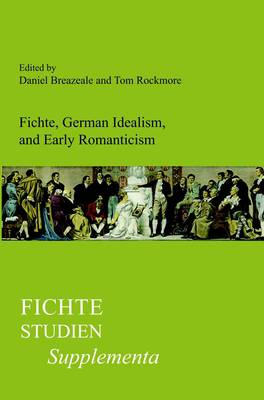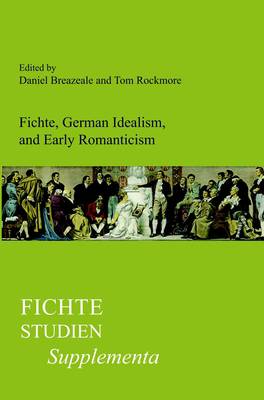
- Afhalen na 1 uur in een winkel met voorraad
- Gratis thuislevering in België vanaf € 30
- Ruim aanbod met 7 miljoen producten
- Afhalen na 1 uur in een winkel met voorraad
- Gratis thuislevering in België vanaf € 30
- Ruim aanbod met 7 miljoen producten
Zoeken
Fichte, German Idealism, and Early Romanticism
€ 197,45
+ 394 punten
Omschrijving
This volume of 23 previously unpublished essays explores the relationship between the philosophy of J.G. Fichte and that of other leading thinkers associated with German Idealism and the early Romantic movement. Several papers explore the broader question of Fichte's relationship and contribution to "German idealism" and "German romanticism" in general, while others offer comparative studies of the relationship between Fichte's writings and those of Leibniz, Kant, Schelling, Hegel, Friedrich Schlegel, Novalis, Schleiermacher, and Wilhelm von Humboldt.
Taken collectively, this set of essays provides anglophone readers with a new and historically accurate understanding of the origin, development, and reception of Fichte's philosophy in the context of its own era and in relationship to the most important intellectual movements of the time. The authors include both well established and internationally recognized experts in their fields as well as younger scholars with fresh and challenging perspectives to offer.
This volume proposes a new interpretation of the history of German idealism in general and of the place therein of Fichte's Wissenschaftslehre. It emphasizes the intimate connection between "transcendental idealism" and "German romanticism" and shows how developments within each of these intellectual movements reflected and in turn influenced developments within the other. Finally, it sheds new light on Fichte's own philosophical development and does so by relating the various stages of his writings to other contemporary movements and authors.
Taken collectively, this set of essays provides anglophone readers with a new and historically accurate understanding of the origin, development, and reception of Fichte's philosophy in the context of its own era and in relationship to the most important intellectual movements of the time. The authors include both well established and internationally recognized experts in their fields as well as younger scholars with fresh and challenging perspectives to offer.
This volume proposes a new interpretation of the history of German idealism in general and of the place therein of Fichte's Wissenschaftslehre. It emphasizes the intimate connection between "transcendental idealism" and "German romanticism" and shows how developments within each of these intellectual movements reflected and in turn influenced developments within the other. Finally, it sheds new light on Fichte's own philosophical development and does so by relating the various stages of his writings to other contemporary movements and authors.
Specificaties
Betrokkenen
- Uitgeverij:
Inhoud
- Aantal bladzijden:
- 396
- Taal:
- Engels
- Reeks:
- Reeksnummer:
- nr. 24
Eigenschappen
- Productcode (EAN):
- 9789042030114
- Verschijningsdatum:
- 1/01/2010
- Uitvoering:
- Paperback
- Formaat:
- Trade paperback (VS)
- Afmetingen:
- 155 mm x 234 mm
- Gewicht:
- 548 g

Alleen bij Standaard Boekhandel
+ 394 punten op je klantenkaart van Standaard Boekhandel
Beoordelingen
We publiceren alleen reviews die voldoen aan de voorwaarden voor reviews. Bekijk onze voorwaarden voor reviews.







